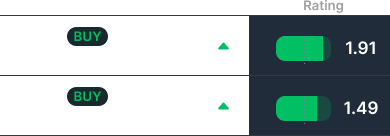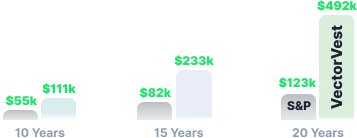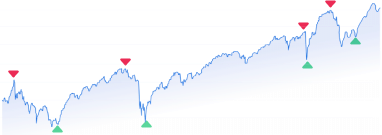by Leslie N. Masonson, MBA
Investors and traders may not give much thought to the weighting of the ETF that they purchase. However, the price performance of the ETF is heavily dependent on how the stocks are weighted in the portfolio. I will provide a tutorial on the two weighting methods that everyone should be familiar with.
First, a definition of the “market capitalization” term is necessary. It represents the dollar value calculated by multiplying the number of outstanding shares of a company’s stock by its price per share.
Next, let’s cover the dollar break-points of how market-capitalization has been classified to designate a typical stock portfolio or to identify individual stocks:
- Large-Cap. $10 billion or more
- Mid-Cap. $2 to $10 billion
- Small-Cap. $250 million to $2 billion
- Micro-Cap. $50 million to $300 million
Market-cap Implications and ETF Examples
One key aspect of market-cap is that the larger companies with higher market capitalizations in each of the four categories have a much greater influence on the index's performance. One extreme example is playing out in today’s market where the tech titans known as “Magnificent 7” (AAPL, AMZN, MSFT, GOOGL, TSLA, META, and NVDA) or the FAANG stocks are dominating both the S&P 500 and Nasdaq indexes to a large extent. In the case of the S&P 500 they account for 25% (over $13 trillion) of the index’s capitalization and about 75% of the index's year-to-date performance. This is a very rare situation and one that hasn't happened since the index was born in. In total there are 893 ETFs that are classified as market-cap weighted with $4.7 billion in Assets Under Management (AUM).
Here are some examples of ETFs with the four capitalizations mentioned above:
-
- Large-Cap: There 244 large-cap ETFs available. A few examples are: SPY, QQQ, IWF, XLK, VOO, VTI, EFA, VB and VUG
- Mid-Cap: There 33 mid-cap ETFs available. A few examples are: IJH, VO, IWR, MDY, VOE, IWS, IWP, VOT and IMCG
-
- Small-Cap: There 33 small-cap ETFs available. A few examples are IJR, IWM, VB, SCHA, VBK, DFAS, SLYV, TNA, and VTWG
- Micro-Cap: There are only 2 micro-cap ETFs available which are iShares Micro-cap (IWC) and First Trust Dow Jones Select MicroCap Index Funds (FDM)
Equal-Weighting and ETF Examples
The second most common weighting approach is known as “equal-weight.” As the name implies, each stock in the index is assigned the same weight without regard to its actual market capitalization. So, an index or ETF-index composed of 50 stocks would assign a 2% weighting to each component. That means that if 10 of the stocks in the index had doubled the performance of the other 40 stocks, their impact would only be 10% of the ETF’s overall performance. Currently, there are 121 ETFs with an equal-weighted focus with only $129.7 million in AUM which is only 2.7% of the assets of the market-weighted ETFs. That shows you where the action is.
A prime example of a well-known equally-weighted ETF is Invesco 500 Equal Weight ETF (RSP). Year-to-date, as of August 18, 2023, RSP has risen 5.25% compared to the SPY which has risen 15.01%, the difference being the “Magnificent 7” outperformance. Looking back at the 10-year performance of these two ETFs shows a tighter spread of only 1.64 percent, with RSP gaining an annualized 10.57% vs. SPY advancing 12.21%. One advantage of this weighting is that smaller companies are not overshadowed as would normally be in a market-cap weighted ETF. Another disadvantage is that more frequent rebalancing is required to bring the portfolio back to its original weighting.
Here are some examples of equally-weighted ETFs with the four categories mentioned above:
-
- Large-Cap: There 41 large-cap ETFs available. A few examples are: RSP, NOBL, FTCS, SPYD, FNGU, QQEW, QQQE, and EQWL
- Mid-Cap: There are only 2 mid-cap ETFs available. Two ETFs are ProShares S&P Midcap 400 Dividend Aristocrat (REGL) and Invesco S&P Midcap Equal Weight ETF (EWMC), with AUM of $1.6 billion and $234 million, respectively.
-
- Small-Cap: There are only 3 small-cap ETFs available. Three ETFs are SMDV, CSML, and DEEP with AUM of $830 million, $181 million, and $39 million, respectively.
- Micro-Cap: There are no ETFs of this size at the present time.
One additional weighting approach that is an outlier to the above discussion, but needs to be mentioned because of its history and importance. That is the Dow-Jones Industrial Average: which is composed of 30 very large well-known companies. This index is price-weighted which means that the highest price stock has the most weight and the lowest priced stock has the least weight.
That’s how the index was created on May 26, 1896, its inception date, and how it currently weights the stocks. This weighting scheme is a rather odd way to construct an index, as it doesn’t appear to me to make any sense as a viable measurement of a group of stocks. Additionally, the Dow-Jones Transportation and Utility Averages are also price weighted, but there are no ETFs for those. The only available ETF is the very popular SPDR Dow Jones Industrial Average ETF Trust (DIA) with $29 billion of AUM.
In summary, both market-cap weighted and equal-weighted indexes have their strengths and weaknesses. Investors need to understand the differences, and then select the ETFs that mirror their risk tolerance and investment goals. Neither weighting method is considered better than the other. It is just a different approach to constructing a portfolio which provides the investors with a choice.
Want These Types of Insights at Your Fingertips so You Can Win More Trades?
Use VectorVest to Analyze any stock free. VectorVest is the only stock analysis tool and portfolio management system that analyzes, ranks and graphs over 18,000 stocks each day for value, safety, and timing and gives a clear buy, sell or hold rating on every stock, every day.
Before you invest, check VectorVest! Click here to ANALYZE ANY STOCK FREE and see our system in action!
What you should do next…
- Get our latest blogs delivered right to your inbox, subscribe to our newsletter.
- The market moves fast! Get our most current evaluation of this stock with our FREE stock analysis tool.
- Looking for stock picks? Not sure if now is the right time to buy/sell? For a limited time, enjoy the full benefits of a 30-day subscription to VectorVest for only [offer_txt] (usually up to [saving_txt]/month) . Get access to our full list of screeners showcasing our top stock picks that tell you exactly what to buy, when to buy, and when to sell.















